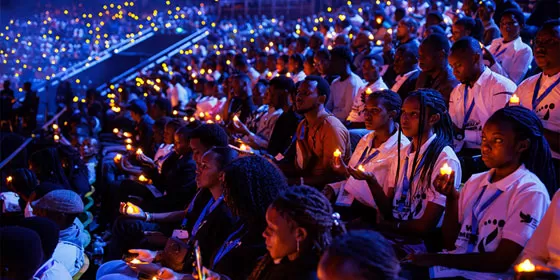April is a significant month for all humanity as it marks Genocide Prevention and Awareness Month. This month is dedicated to remembering the millions of lives lost to genocide and other mass atrocities throughout history. It is a time to reflect on the past, to honor the victims and to unite in the fight against these heinous crimes.
Genocide, the deliberate and systematic extermination of a particular group of people, is a dark stain on our world’s history. From the Holocaust to the Rwandan genocide, humanity has witnessed some of the most horrific crimes against humanity. It is a tragedy that we should never forget. This is why Genocide Prevention and Awareness Month is so crucial. It is a reminder that we must never allow such atrocities to happen again.
The month of April was chosen to commemorate the anniversary of the 1994 genocide in Rwanda, where approximately 800,000 people were brutally massacred because of their ethnicity. This tragedy serves as a sobering reminder that genocide can happen anywhere, at any time, and to any group of people.
Genocide is not a spontaneous act; it is a process that develops over time. It starts with discrimination, hate speech, and dehumanization of a particular group. When left unchecked, it can escalate into violence and ultimately result in genocide. That is why it is crucial to recognize the warning signs and take action before it is too late.
This is where we all have a role to play. Each and every one of us has a responsibility to stand up against hate, discrimination, and violence. We must promote tolerance, acceptance, and respect for diversity. We must educate ourselves and others about the history of genocide and its causes, so we can recognize and address its early signs.
Moreover, governments, civil society, and international organizations have a duty to protect populations facing the threat of genocide and other mass atrocities. The United Nations’ adoption of the Responsibility to Protect (R2P) in 2005 is a significant step towards preventing genocide and other mass atrocities. R2P acknowledges that states have the primary responsibility to protect their populations. However, when states fail to do so, the international community has a responsibility to intervene, through peaceful means if possible, to protect those at risk.
But prevention is not enough; we must also remember and honor the victims of past genocides. This month provides us with an opportunity to pay tribute to the millions of lives lost and to ensure that their stories are never forgotten. Through education, remembrance, and memorialization, we can ensure that the victims are not reduced to mere statistics but are remembered as individuals with hopes and dreams, just like us.
It is also essential to acknowledge that genocide does not only affect those who are killed; it also has long-lasting impacts on survivors and their communities. It causes trauma, displacement, and leads to societal divisions and mistrust. Thus, we must support survivors and provide them with the necessary resources to rebuild their lives and communities.
This April, as we reflect on the history of genocide, we must also recognize that the threat of genocide still looms over many populations around the world today. The Rohingya in Myanmar, the Uyghurs in China, the Yazidis in Iraq, and many other minority groups are facing persecution, discrimination, and violence based on their identity. We cannot turn a blind eye to their suffering; we must act to prevent another genocide from occurring.
We must also take into account that genocide can take different forms, such as ethnic cleansing, war crimes, and crimes against humanity. Thus, our efforts to prevent genocide must also include addressing these other forms of mass atrocity crimes.
In conclusion, Genocide Prevention and Awareness Month is a time for us to come together and remember the past, recognize the present, and take action for the future. It is a call to humanity to stand against hate, to promote unity and understanding, and to protect the vulnerable. Let us honor the victims of genocide by committing ourselves to prevent such atrocities from ever happening again. Let us work towards a world where peace, diversity, and respect for human rights are the foundation of our societies.



